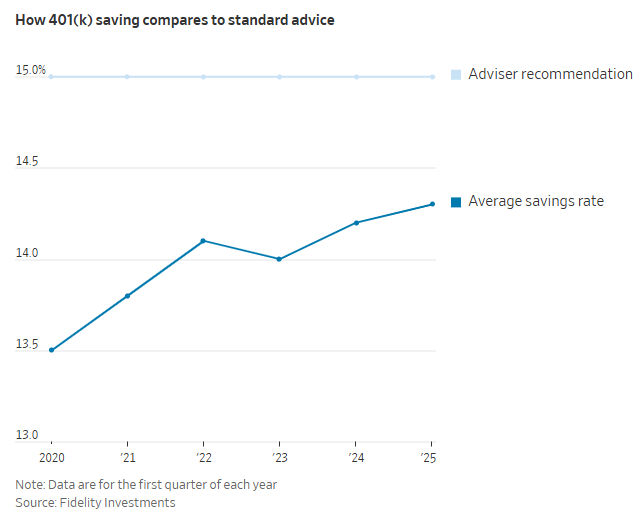20 Tips to Stretch Your Social Security Benefits
Workers are often advised to save for retirement so they have enough income to manage their bills later in life. But unfortunately, a lot of people end up retiring on only or mostly Social Security. The average retired worker on Social Security today collects about $2,002 per month. Clearly, that’s not a very large paycheck. […] The post 20 Tips to Stretch Your Social Security Benefits appeared first on 24/7 Wall St..

Key Points
-
You may only be looking at a limited amount of Social Security each month.
-
Living on those benefits alone can be challenging.
-
With the right strategy, you can make the numbers work.
-
Are you ahead, or behind on retirement? SmartAsset’s free tool can match you with a financial advisor in minutes to help you answer that today. Each advisor has been carefully vetted, and must act in your best interests. Don’t waste another minute; get started by clicking here.(Sponsor)
Workers are often advised to save for retirement so they have enough income to manage their bills later in life. But unfortunately, a lot of people end up retiring on only or mostly Social Security.
The average retired worker on Social Security today collects about $2,002 per month. Clearly, that’s not a very large paycheck. So if you’re someone who’s very reliant on Social Security in retirement, it’s important to take steps to stretch those benefits as far as possible. Here’s how.
1. Downsize

Your home might be one of your largest monthly expenses, even if it’s fully paid off. Downsizing is a great way to free up income. With less square footage, you may be looking at lower utility bills, less maintenance, and a smaller property tax and insurance bill.
2. Rent out part of your home

If downsizing isn’t something you want to do, or if it’s not feasible, you could try hanging onto a larger home but renting out a portion instead. This may be possible if you have a finished basement or garage, or another part of your home that’s separate.
3. Do your own home maintenance

Home maintenance is something you might have to throw money at while you’re working due to a lack of time. If you’re retired, you may have more time to take care of your home yourself. That could save you a lot of money.
4. Become a one-car household

When you’re commuting to a job, having multiple cars is often a necessity. Once you’re retired, you may be fine with a single vehicle. Getting rid of one car could free up a lot of money in your budget.
5. As for a car insurance discount

If you’re not doing a lot of driving, your auto insurer is taking less risk. It pays to contact your insurance company and see if you can get a discount on your premiums if you’ll only be using your car here and there.
6. Pay off debt before retiring

The more debt you have hanging over your head, the more of your income you’ll lose to interest. When you’re trying to stretch a Social Security check, that’s a problem. Aim to pay off as much debt as possible before retirement so you have one less expense to worry about.
7. Work part-time in retirement

Working part-time is a great way to generate extra money and make it work to live mostly on Social Security. You can find a traditional job or join the gig economy if you’d rather your schedule stay flexible. And rest assured that you can work and collect Social Security at the same time.
8. Seek out senior discounts where you can

Many restaurants and retailers offer senior discounts. And if you live someplace with public transportation, you may be eligible for reduced fares. Do some research to see what savings you can snag.
9. Delay your Social Security claim for more money

Social Security will pay your complete monthly benefit based on your income history at full retirement age. But if you delay your claim past that point, your benefits can grow 8% per year you do, up until age 70. If you can wait on Social Security, you should have larger checks to work with.
10. Review your Medicare plan choices each year

Medicare may be a big expense of yours. It pays to review your plan choices every year during fall open enrollment. Switching Advantage or Part D plans could result in lower out-of-pocket costs.
11. Prioritize your health to stave off issues

The better you take care of your health, the less money you might have to spend on medical bills. Visit your doctor for routine checkups and do all of the screenings that are recommended for you to stay on top of health issues.
12. Seek out free entertainment

When you’re retired, it’s important to keep busy. There may be different types of free entertainment available in town, whether it’s concerts or classes at your local community center. And remember, it’s always free to take a walk through a local park.
13. Cancel subscriptions you don’t really use

You may be paying for a streaming service or something similar you hardly ever use. Go through your bills and cancel services that aren’t giving you great value. There’s no need to waste money at a time when it’s tight.
14. Be mindful of electricity usage

Being careful with electricity usage could help your Social Security benefits last all month long. Shut off lights when you aren’t using them and unplug appliances when they aren’t needed.
15. Use water carefully

The less water you waste at home, the lower your water bill might be. Set a timer when you get into the shower to avoid taking too long, and be mindful of running the water too heavily when you wash dishes. Also wait for a full load to do laundry or run your dishwasher.
16. Negotiate your cable or cell phone bill

There’s no rule stating the cable or cell phone deal you have now is the only one out there. Your providers may be willing to give you a discount to avoid losing you as a customer, so it pays to try to negotiate. And if they won’t negotiate, shop around for a better rate.
17. Move to an area with a lower cost of living

The nice thing about Social Security is that it’ll pay you the same monthly benefit no matter where you live. It pays to explore different parts of the country to see if there’s an area where your money could do more for you.
18. Move in with a grown child

If you’re having trouble covering your costs on your Social Security income, consider moving in with a grown child. If you have a grown child with their own kids who need care, you could serve as a built-in babysitter.
19. Take staycations for fun

Many people look forward to traveling in retirement. If money is tight, take a series of staycations. You may discover new things you didn’t know were right in town.
20. Use the right credit cards for cash back and rewards

When you’re heavily dependent on Social Security to cover the bills, every bit of extra money helps. It pays to do some research on credit cards and find ones that offer generous rewards on the items you buy regularly, like food and gas for your car. The more cash back you rack up, the easier it becomes to pay your bills.
The post 20 Tips to Stretch Your Social Security Benefits appeared first on 24/7 Wall St..

















































































































































































